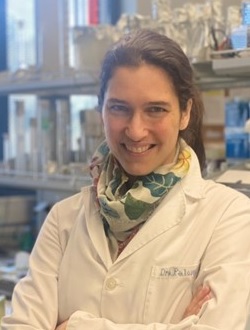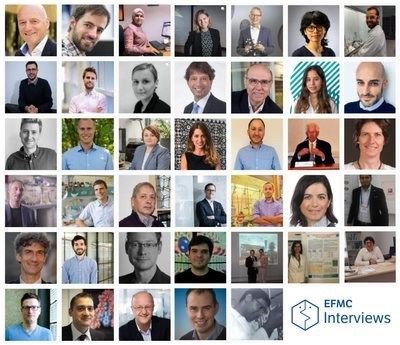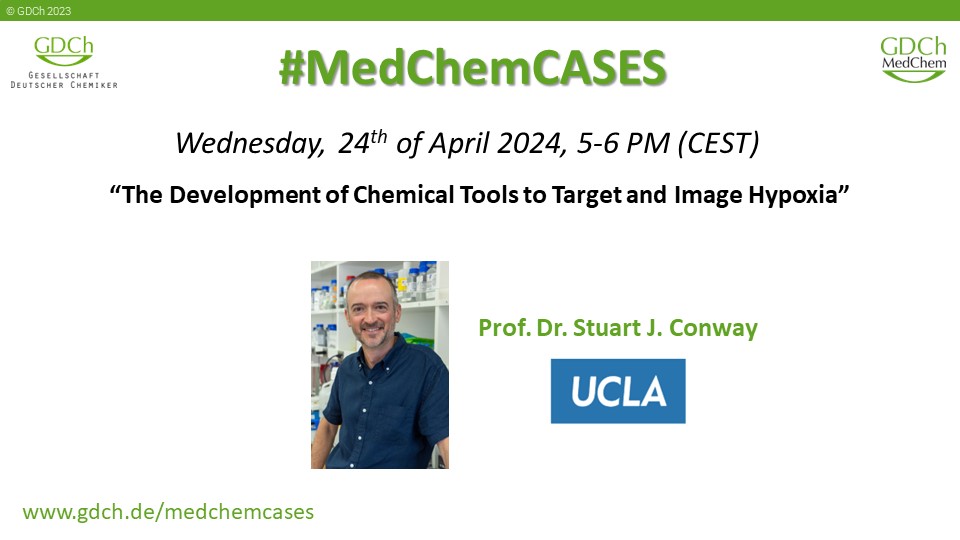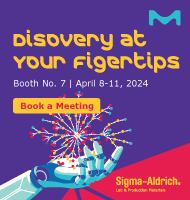|
|
EFMC-YSN MENTORING PROGRAMME 2024 – APPLICATIONS ARE OPEN
To inspire, connect and provide opportunities to medicinal chemists and chemical biologists in their Early Career, the Young Scientists Network of the EFMC is hosting the third edition of the mentoring programme, aiming to connect motivated students with high-profile mentors.
The mentoring programme is shaped for PhDs (up to 18 months before the end PhD) and Post-docs, who are seeking a career in medicinal chemistry, chemical biology or related fields, either in industry or academia. The main objective is to support their transition into the job market by providing feedback, soft-skill training, and overall guidance.
More information and mentee application on www.efmc.info/mentoring-programme.
Deadline for application is March 31, 2024.
Want to join the programme as a mentor? Reach out to us at ysn@efmc.info.
MEET THE SYNTHIA TEAM AT MEDCHEMFRONTIERS 2024
17th EFMC-YSN MEDCHEMBIOONLINE | KNOWLEDGE CREATION FROM FAILURE
We are happy to announce the final programme of this edition dedicated to sharing the “hidden medicinal chemistry” from the programs that never make it, or the parts of the research program that didn’t go according to plan.
- Combining Data-driven and Chemoinformatical False Positive Mitigation Strategies in High-throughput Screening
Dr Michael Margreiter (Evotec, Germany)
- Topical JAK Inhibitors for Atopic Dermatitis: From “soft” to “super-soft”
Dr Gebhard Thoma (Novartis, Switzerland)
- Rethinking Failure: Lessons Learned from the Lab's Untold Stories
Prof. Daniel Rauh (TU Dortmund University, Germany)
- Round Table Discussion
Dr Stephanie Gueret (AstraZeneca, Sweden)
Dr Michael Margreiter (Evotec, Germany)
Dr Gebhard Thoma (Novartis, Switzerland)
Prof. Daniel Rauh (TU Dortmund University, Germany)
The event will take place on March 26 between 16:30 and 18:30 CET and we kindly invite you to register on https://www.medchembio.online/.
Registration to the event is free and open to all thanks to the generous support of Symeres.
LITERATURE SPOTLIGHT
The “literature spotlight” section of the newsletter will bring you a summary of recently published research in a concise and accessible way. Multiple thematics from different journals will be highlighted thanks to the valuable contribution of members of the EFMC working groups.
This contribution focuses on the recently published article “Late-Stage Diversification of Pyrazoles as Antileishmanial Agents” by Tobias Winge, Ben Perry, An Matheeussen, Guy Caljon and Bernhard Wünsch, ChemMedChem 2024, e202400028.
Visceral leishmaniasis, which affects organs such as the spleen, liver and bone marrow, carries a high mortality risk and is most prevalent in Africa, Asia and the Mediterranean region. Historically treated with pentavalent antimony drugs, their use has declined due to drug resistance. N-pyrazolyl substituted amides showed promising anti-leishmanial activity, but low metabolic stability led to the development of N''.chr('8209').''pyrazolylureas and N-pyrazolylcarboxamides with improved properties. This study, as part of the open synthesis network (OSN) of the Drugs for Neglected Diseases Initiative (DNDi), focused on the late-stage diversification of 3-bromopyrazoles through Pd-catalysed Sonogashira and Suzuki-Miyaura cross-coupling reactions, leading to a varied set of pyrazoles with diverse substituents. The cyano moiety’s electron''.chr('8209').''withdrawing properties in the 4-position limited acylation of the primary amino moiety in the 5''.chr('8209').''position. Evaluation of a large set of pyrazoles bearing diverse aryl and alkynyl substituents in the 3''.chr('8209').''position revealed that urea 38, lacking the cyano moiety and featuring a 4-benzylpiperidino group, exhibited modest antileishmanial (IC50 = 19 µM) and antitrypanosomal (IC50 = 7.9 µM) activity.
Read the article here: https://chemistry-europe.onlinelibrary.wiley.com/doi/10.1002/cmdc.202400028 SYMERES PHD PRIZE FOR EXCELLENCE IN CHEMISTRY IN LIFE SCIENCES RESEARCH – DEADLINE IS APPROACHING
The deadline to apply for the 2nd Symeres PhD Prize for Excellence in Chemistry in Life Sciences Research is quickly approaching!
Upon application, the submission will be peer reviewed and the 5 best candidates will be invited to the Symeres facilities in Nijmegen, The Netherlands to present their work. The prizes will consist of a diploma and a cash prize of 1000€ for the winner, 600€ for the runner-up and 400€ for the third place. The winner will also be invited to deliver an oral communication at the EFMC Young Medicinal Chemists' Symposium (EFMC-YMCS 2024) in Rome, Italy.
Application deadline is March 20, 2024! - More information under this link.
MEET VALLE PALOMO, IMDEA NANOCIENCIA, SPAIN
In this edition, our MedChemBioConversations is Dr Valle Palomo from IMDEA Nanociencia, Spain.
Get to know her better by reading the interview below:

How did you get interested in Medicinal Chemistry?
I studied chemistry and while I enjoy organic chemistry and synthesizing compounds, my most motivation relies on knowing that the compounds we make could be useful to treat diseases. I performed my PhD studies at the Medicinal Chemistry institute from CSIC in Madrid, under the supervision of Dr. Ana Martinez and Dr. Carmen Gil from 2008 to 2012, where I developed compounds that were able to protect neurons from toxic insults and promote neurogenesis to create new neurons. Afterwards, I did my postdoc at The Scripps Research Institute in La Jolla, US, under the supervision of Dr. Phil Dawson, working on peptides and Quantum Dots.
Where are you currently working and what is your current position?
Currenlty I am the head of the lab Biosensors in Neuroscience at IMDEA Nanoscience. We are working on developing sensors that allow us to efficiently select future drugs for neurodegenerative diseases that protect neurons and improve their homeostasis in models of neurodegeneration. In addition, we work in the development of multifunctional drugs.
How would you explain what your research area is to non-scientists?
We try to understand whether a drug will protect damaged neurons in neurodegenerative diseases and could ultimately stop or slow down neurodegeneration.
What kind of tasks does your work involve?
I supervise my students, help them make the experiments work and analyse with them the data. A lot of my work consists in writing, from reports to grant proposal to publications and posters. I also spend a considerable time preparing and giving talk and seminars and finally I try to keep up with the recent literature in my area.
How many PhD students and postdocs do you currently supervise?
I currently supervise 4 PhD students, 1 master student and 1 undergrad.
Are you currently looking for a new PhD student or a postdoc?
Yes! I am looking for a PhD student to work in a Doctoral Network (TClock4AD) and a Postdoc, as part of the Ideal postdoctoral call from IMDEA Nanociencia.
How would you describe yourself as a supervisor?
I try to guide my students as best as I can, showing them how to properly design and perform experiments and giving them solutions when things fail. Also I try to make a friendly environment in the lab, we have group meeting every week with pastries and make a fun activity every year together. A PI does not only need to be a valuable scientist knowing how to design experiments and analyse them but also you need to be able to manage people and projects that make the whole research group function.
What do you consider your greatest achievement in your scientific career?
I believe my achievements are related to using chemical tools to tackle complex aspects of biology such as understanding the role of GSK-3 enzyme in neurodegenerative diseases, that was discovered through the synthesis of chemically and biologically diverse inhibitors, or the use of dynamic sensors to understand key biological processes.
Which of your papers are you most proud of and why?
I am particularly proud of the development of multitarget compounds against Alzheimer’s disease (Angew. Chem.2021, 60, 19344) in which not only we discovered promising compounds but we used in situ click chemistry with BACE1 as a template.
What are the features of a successful PhD student or postdoc?
Curious, hard-working, innovative and meticulous. I have to say that maybe one does not excel at all of those but if they are not imperative, just know and exploit your strengths and work on your weaknesses!
What advice would you give to someone who wants to know more about your field?
There are plenty of learning resources and outreach activities organised for example from my research centre, IMDEA Nanociencia. Come to any of those and we would love to explain our science to you.
Have you experienced any unfair situations during your scientific career? How would you advise scientists facing similar situations?
Sometimes the rejection of a grant or paper is difficult but if you believe in the project, keep on improving it and working hard and results will come. Also not everything is about the prestige of journals or awards, it is more important to be a good supervisor and train new good scientists for tomorrow’s problems. Finally we live in a very competitive world and with many talented scientists, and sometimes it is overwhelming if you do not achieve everything your colleagues do. Here I would say that keep on working, believe in yourself and keep up the good work. Results will come naturally and we don’t need to be obsessed with them but with doing the best we can as scientists.
What is the most embarrassing thing you have done in the lab while doing experiments, e.g. explosions?
I have had to extract the rotavap water and purify again a compound after droping it there….
What are your recommendations for a book, podcast, website, blog, YouTube channel or film?
I recommend the books from María Dueñas, I love In the Pipeline blog from Derek Lowe and I am a fan of tiny desk concerts.
Which scientist do you admire the most and why?
I admire many, especially the ones I collaborate with now, the ones that have trained and supervised me and those that have given me opportunities during my career. And to name a well-recognized researcher I will say I admire Rafael Yuste, one of the initiators of the brain initiative, that not only works towards the progress of neuroscience but also to protect human rights.
Which field of medicinal chemistry do you consider the most promising for the future?
I am fascinated about Protacs and am excited to see what they can achieve in the clinic. In addition, I also believe multitarget drugs are highly promising for the treatment of complex diseases specially when they process a synergistic targeting different pathways.
What would you expect to be the next major breakthrough in medicinal chemistry?
Another fascinating therapeutic approach in central nervous system diseases is targeting our microbiome. The connexion it seems to have with neurodegenerative diseases is fascinating and I am sure we will see nice discoveries in this area. GET SHOWCASED IN MEDCHEMBIOCONVERSATIONS

Are you a Medicinal Chemist/Chemical Biologist/Computational Chemist?
Are you passionate about science?
Want to be our next interviewee?
Share your story with us by taking our questionnaire:
https://www.efmc.info/interviews-efmc
9th EUROPE CHEMISTRY CONGRESS – EARLY-BIRD DEADLINE IS APPROACHING
The Institute of Chemistry of Ireland (ICI) is delighted and honoured to be organising the 9th EuChemS Chemistry Congress (ECC-9), to be held in Dublin, Ireland, from 7th – 11th July, 2024.
Early Bird Registration Fee Closes on Friday, March 8, 2024 while poster submission will remain available until May 10, 2024.
The EFMC is proud to contribute to the programme with a session on “The Potential of Electrochemistry to Power Drug Discovery”, with confirmed lecture of Prof. Kevin Lam (University of Greenwich, UK) and Dr Nessa Carson (AstraZeneca, SE).
More information and registration: https://euchems2024.org/
SCT–YOUNG MEDCHEM FORUM: THE 4 FIRST EPISODES OF “MY PUBLICATION AT A GLANCE”
- Dr. Sébastien Depienne (University of Nantes), Click-electrochemistry for the rapid labeling of virus, bacteria and cell surfaces, Nat. Commun., 2023, 14, 5122.
- Nina Compagne (University of Lille), Optimization of pyridylpiperazine-based inhibitors of the Escherichia coli AcrAB-TolC efflux pump, J. Med. Chem., 2023, 259, 115630.
- Dr. Rémi Châtre & Estelle Blochouse (University of Poitiers), Induced-volatolomics for the design of tumour activated therapy, Chem. Sci., 2023, 14, 4697-4703.
- Aline Delamare (IECB), Hexafluoroisobutylation of enolates through a tandem elimination/allylic shift/hydrofluorination reaction, Chem. Sci., 2022, 13, 9507–9514.
#MEDCHEMCASES - SEMINAR BY THE DIVISION OF MEDICINAL CHEMISTRY OF THE GERMAN CHEMICAL SOCIETY (GDCH)
The MedChem Division of the German Chemical Society (GDCh) would like to invite you to the next #MedChemCASES online seminar which will be held on April 24 (5.00pm) by Prof. Dr. Stuart J. Conway
The topic of the webinar will be “The Development of Chemical Tools to Target and Image Hypoxia”.

Tumor hypoxia (low oxygen levels) is associated with resistance to all therapeutic approaches to treat cancers, and consequently poor patient prognosis. Hypoxia-activated prodrugs (HAPs), designed to selectively release a bioactive compound in oxygen-deficient cells, while sparing healthy tissue, represent a promising therapeutic strategy for treatment of cancers.[1,2] I will discuss our recent work to develop HAPs applied to a lysine deacetylase (KDAC) inhibitor and PROTACs. We have developed NI-Pano (CH-03), a novel hypoxia-activated version of the clinically approved KDAC inhibitor, panobinostat. We demonstrated the pre-clinical efficacy of NI-Pano, showing that it is stable in normoxic (21% oxygen) conditions but undergoes NADPH-CYP-mediated enzymatic bioreduction to release panobinostat selectively in hypoxia (
Register for free here.
#GDCh (MedChem Division), #NextGenMedChem.
References
(1) Cazares-Korner et al. ACS Chem. Biol. 2013, 8, 1451–1459.
(2) O’Connor et al. Nat. Protoc. 2016, 11, 781–794.
(3) Skwarska, Calder et al. Cell Chem. Biol. 2021, 28, 1258.
(4) Tosun, Wallabregue, Mallerman et al. JACS Au 2023, 3, 3237. NEWS FROM THE BIOLOGICAL AND MEDICINAL CHEMISTRY SECTOR (BMCS) OF THE ROYAL SOCIETY OF CHEMISTRY (RSC)
The BMCS is happy to announce several upcoming events.
The BMCS Mastering MedChem VIII: 8th RSC-BMCS Symposium on Mastering Medicinal Chemistry
15th March, 2024, Burlington House, London, UK
Website: https://www.rscbmcs.org/events/mastermedchem24/
Synopsis: Mastering Medicinal Chemistry VIII is the latest in an ongoing series of conferences intended to provide expert advice and guidance to new practitioners in the field of drug discovery. It has been said that “there are two types of drug discovery programmes: those that hit serious problems and those that are going to hit serious problems”. Anticipating and preparing for such problems thus accelerates the delivery of new medicines: this event will feature presentations from experienced ‘drug-hunters’ in both industry and academia, who will talk about the challenges faced in modern drug discovery, and will share best practice common to all successful medicinal chemists.
RSC-BMCS 35th Medicinal Chemistry in Eastern England
25th April 2024, GSK Conference Centre, Stevenage UK – PLEASE NOTE CHANGE IN VENUE
Website: https://www.rscbmcs.org/events/mcee35/
Synopsis: Known colloquially as the “Hatfield MedChem” meeting, this is a highly successful, long-standing, one-day meeting that runs annually. The scientific program will comprise presentations showcasing medicinal chemistry case studies from tools to candidates, across a range of modalities, therapeutic areas and target classes, as well as covering more general topics at the forefront of drug discovery. The meeting aims to be informal and interactive, and is ideal for all those working in medicinal chemistry and drug discovery more widely.
Hot Topics: Covalent Drug Discovery 2024
16th May 2024, Virtual
Registration is now open!
Website: https://www.rscbmcs.org/events/hottopicscdd24/
Synopsis: Covalent binding has emerged as a key strategy in contemporary drug discovery. This online, half-day meeting will bring together experts from both academia and industry to discuss recent advances in using covalent small molecules to target challenging protein targets. The BMCS Hot Topics online meetings are intended to highlight breaking areas of research in fields of science relevant to drug discovery. They will run as stand-alone half-day virtual events, 2-3 times per year. The programme will be targeted towards researchers working who would like to enhance their understanding of these nascent or developing fields.
4th Synthesis in Drug Discovery and Development
4th – 5th June, Virtual
Registration is now open!
Website: https://www.rscbmcs.org/events/sddd24/
Synopsis: Synthesis is at the heart of drug discovery and development. The industry has increasingly demanded higher quality clinical candidates and has sought to exploit less druggable biological targets. Densely functionalised small molecules with a high degree of synthetic complexity are often the result of these demands. Successful programmes therefore require the application of innovative synthesis in all stages of discovery and development. The medicinal chemist’s toolbox is also enhanced by the introduction of novel bioisosteres, often made available only through the application of new synthetic methods. This symposium aims to celebrate the crucial role of synthesis in the success of drug discovery and development.
3rd RSC / SCI New Therapeutics for Global Health
9th – 11th September 2024, Cranfield Management Development Centre, Cranfield University, Milton Keynes
RSC/BMCS/SCI
Abstract submissions are now open!
Website: https://www.rscbmcs.org/events/ntgh24/
Synopsis: Tuberculosis, malaria and diseases caused by a diverse range of pathogens, including flaviviruses (eg dengue, West Nile), kinetoplastids (causative agents of Chagas disease, leishmaniasis, etc) and gut pathogens (worms, bacteria, parasites),
remain a cause of high mortality across the globe. Fortunately, an ever-improving understanding of the complex life-cycles of these disease-causing pathogens is presenting increasing opportunities for those seeking to tackle these global health problems. This meeting will focus on medicinal chemistry approaches to developing new medicines for diseases affecting global health. Keynote talks from international experts from industry and academia, alongside perspectives detailing case histories in drug discovery, will highlight the latest developments in the field whilst also showcasing the opportunity for creativity and innovation.
9th GPCR’s in Medicinal Chemistry
2nd – 4th October 2024, Evotec Campus Levi-Montalchini, Verona, Italy
Registration is now open!
Website: https://www.rscbmcs.org/events/gpcrs24/
Synopsis: The key role of G protein-coupled receptors (GPCRs) in human disease underpins their importance to modern medicine. We were pleased to hold this 9th meeting in the series on GPCR drug discovery, which combined cutting edge medicinal chemistry with innovative structural biology and novel drug design approaches. |
|
|
|
|
|
ISSUE SPONSORED BY

EFMC ORGANISED EVENTS
March 26, 2024
Virtual Event
17th EFMC-YSN MedChemBioOnline
April 8-11, 2024
Utrecht, The Netherlands
EFMC-ACSMEDI Medicinal Chemistry Frontiers 2024
April 21-24, 2024
Oegstgeest, The Netherlands
18th EFMC Short Course on Medicinal Chemistry
September 1-5, 2024
Rome, Italy
XXVIII EFMC International Symposium on Medicinal Chemistry (EFMC-ISMC 2024)
September 5-6, 2024
Rome, Italy
11th EFMC Young Medicinal Chemists' Symposium (EFMC-YMCS 2024)
EFMC SPONSORED EVENTS
April 25, 2024
Stevenage, United Kingdom
RSC-BMCS 35th Medicinal Chemistry in Eastern England
May 13-15, 2024
Biarritz, France
European Symposium on Biological and Organic Chemistry (ESBOC57)
May 16, 2024
Virtual Event
BMCS Hot Topics: Covalent Drug Discovery 2024
June 4-5, 2024
Virtual Event
4th Synthesis in Drug Discovery and Development
July 3-5, 2024
Bordeaux, France
58th International Conference on Medicinal Chemistry
EFMC CERTIFIED SCHOOLS
June 30 - July 4, 2024
Urbino, Italy
43rd Advanced Course of Medicinal Chemistry and Seminar for PhD students (ESMEC 2024)
August 25-39, 2024
Bergün, Switzerland
Swiss Summer School 2024 in Chemical Biology
October 13-18, 2024
Leysin, Switzerland
15th Swiss Course on Medicinal Chemistry 2024
EFMC SPONSORED SCHOOL
July 1-5, 2024
Oss, The Netherlands
Radboud Summerschool: Introduction into Preclinical Drug Discovery
JOB PORTAL
PhD Chemistry, Chemical Biology, Proteomics, Leiden University, THE NETHERLANDS
Read more
Research Scientist in Biochemistry, Edelris, FRANCE
Read more
Full Professor - Head of the Organic and Pharmaceutical Chemistry Dept., University Ramon Llull, SPAIN
Read more
|
|
